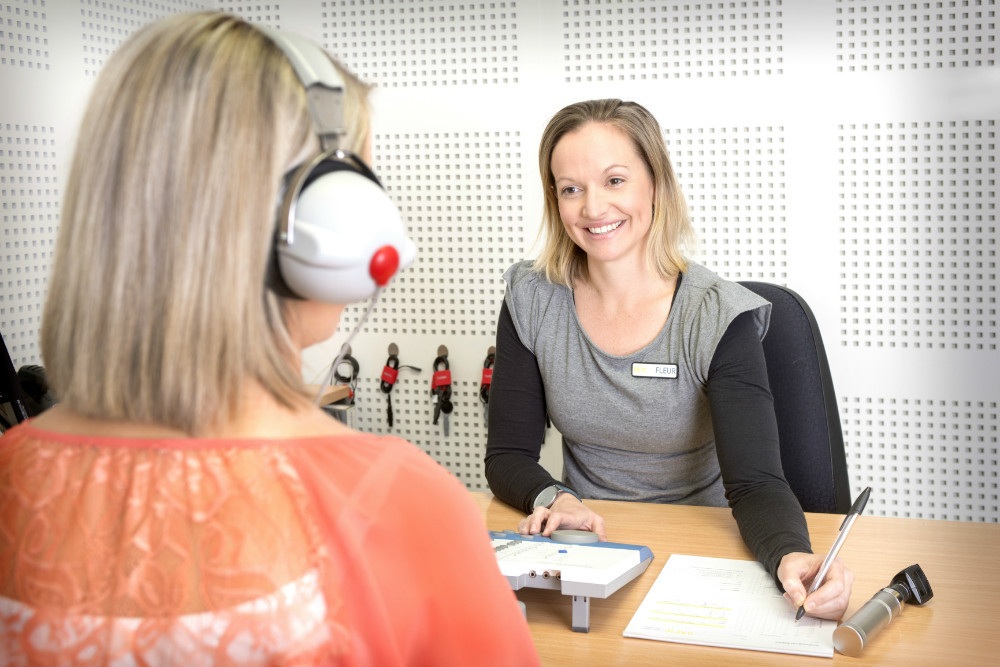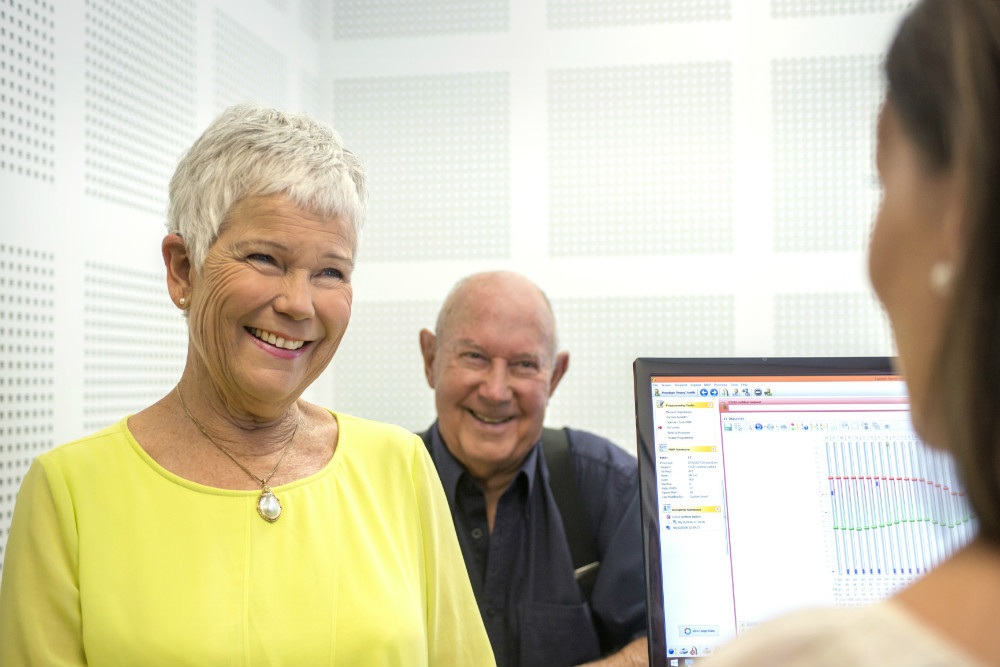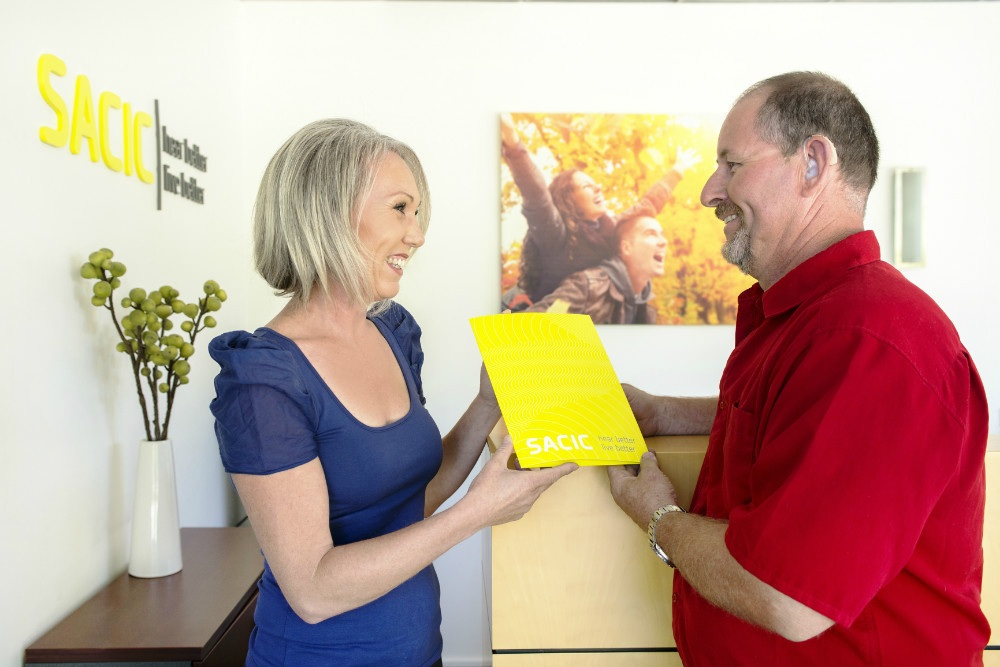Our process
At Cochlear Implants SA we believe all people with hearing loss should have the opportunity to hear and communicate better, to engage with and enjoy life.
If you have a hearing loss, gain limited benefit from conventional hearing aids and are motivated to improve your hearing then take the next step with Cochlear Implants SA and find out if a hearing implant solution may be right for you.
Step 1: Assessment
At Cochlear Implants SA we assess your individual hearing needs to determine if hearing implant technology could help you hear better. This process includes:
- Assessment of your hearing, speech understanding and balance function
- Consultation with an ENT specialist, including CT and MRI scans
- Coordination with your Hearing Aid Provider, GP and other specialists as needed
We provide information about hearing implant technology, encourage questions and offer you the opportunity to connect with a hearing implant recipient. You are welcome to bring a family member or friend to each of your appointments. At Cochlear Implants SA we guide you each step of the way toward better hearing.

Step 2: Surgery
Your Surgeon will assess your fitness for surgery and ear anatomy in addition to any technical considerations applicable to the type of hearing implant being considered. Your Surgeon may also arrange a pre-operative appointment for you with your Anaesthetist and for any other relevant medical investigations required, such as CT and MRI scans.
Cochlear Implants SA's surgeons operate at either St Andrews Hospital (Adelaide) or Memorial Hospital (North Adelaide) or Flinders Private Hospital (Bedford Park). In most cases your admission to hospital will be on the day of surgery.

Find out more:
Cochlear Implant Surgery
Cochlear implant surgery generally takes 1-2 hours and is commonly performed under a general anaesthetic. It is ear surgery, not brain surgery. Once anaesthetised and antibiotics have been given, a small incision is made behind your ear. This allows the Surgeon access to the mastoid; a system of air cells within the bone behind the ear that connects to the middle ear. By carefully following these air cell tracts it is possible to gain access to the middle ear space without disturbing the ear canal and ear drum. From this position, the Surgeon can see your cochlea and prepare for insertion of the cochlear implant electrode array. At completion of surgery the wound is carefully closed and a firm bandage is left on overnight.
Following surgery
Following surgery you can expect to stay in hospital for 1 night. Occasionally a longer stay may be required. You will not be discharged from hospital until you are well enough to go home. An X-ray is usually taken the day after your surgery to check the position of the cochlear implant. Cochlear implant surgery is well tolerated by most people with minimal discomfort. Some people may experience dizziness, which is generally mild and short lived.
Upon discharge home, it is important to rest. We recommend you take time off work until your follow-up appointment with your Surgeon, approximately one week after surgery. Your Surgeon will make sure healing is occurring well and will remove the sutures.
Bone Conduction Implant Surgery: OSIA and Bonebridge systems
OSIA and Bonebridge surgery is performed under general anaesthetic and takes approximately one hour to complete. A small incision is made behind the ear to expose the bone and a pocket is fashioned for the receiver. The implant is attached to the bone, which enables the transmission of sound through the bone to the inner ear. The wound is closed, and a dressing is applied overnight.
While the OSIA and Bonebridge implant systems work differently, both are fully implanted under the skin with an externally worn sound processor.
Following surgery
Following OSIA and Bonebridge surgery you will most likely stay in hospital overnight and be discharged the following morning. Discomfort is usually minimal.
Specific care instructions will be provided by your Surgeon, who will arrange to see you approximately one week after surgery for a review and removal of your sutures.
Bone Conduction Implant Surgery: Connect and Attract systems
Surgery for Connect and Attract Bone Conduction Implants generally takes less than an hour. It can be performed under a general or local anaesthetic depending on the type of implant chosen, your general health and the preference of you and your Surgeon. Once the site for the implant has been chosen, a small incision is made and the bone of the skull is exposed. A 3-4 mm deep hole is prepared for the implant to be screwed into the bone. Regardless of the type of bone conduction implant chosen, the key feature is osseo-integration, which is a process whereby living bone grows into the porous metal of the implant. This allows it to become part of the bone, which enhances the strength and sound conduction properties of the device.
For the Connect system an abutment protrudes through the skin for direct attachment of the sound processor. For the Attract system a magnet is attached to the implant prior to closure of the skin. A dressing is then applied.
Following surgery
Depending on the time of the operation, your individual circumstances and general health you may be discharged from hospital on the day of surgery or the following day. Discomfort is minimal and in most cases you will be able to return to normal activities within a few days. Post operative care will vary depending on the type of implant and will be explained by your Surgeon.
An appointment with your Surgeon will be made for you approximately one week after surgery. At this time your wound is checked, and the sutures are usually removed.
Step 3: Switch On
Activation of your hearing implant involves fitting and switch on of the sound processor. This is an exciting step on your journey to better hearing. Patience and perseverance are required as you adapt to hearing with your cochlear or bone conduction implant.
The team at Cochlear Implants SA is here to support you and your family as you adjust to life with a hearing implant. We work to optimize your hearing and enhance your listening and communication skills; we tailor your rehabilitation program to meet your individual needs and work toward achieving your hearing goals.

Find out more:
What to expect after Cochlear Implant Surgery
The team at Cochlear Implants SA will work with you to optimize your hearing with your cochlear implant. This will include:
- Fitting of the sound processor and activation of the cochlear implant approximately two weeks after your operation
- A series of appointments in the first month of switch on to help you adapt to electrical stimulation and become confident in managing your device
- Listening and communication practice
- Ongoing support for you, your family and those involved in your care to ensure you are enjoying better hearing and achieving best hearing outcomes
Over time you will continue to adapt to electrical stimulation and improved access to sound; you will begin to integrate the cochlear implant into your daily life and less programming will be required. While the need for support may lessen over time, the team at Cochlear Implants SA is always here for you. Routine review on a 6-12 monthly basis is recommended to ensure your cochlear implant and sound processor are well maintained, your hearing remains optimal, and we are supporting you to achieve your hearing and communication goals.
What to expect after Bone Conduction Implant Surgery
The team at Cochlear Implants SA will work with you to optimize your hearing with your bone conduction implant. This will include:
- Fitting of the sound processor approximately two weeks after surgery for the Attract, OSIA and Bonebridge systems and approximately six weeks after surgery for the Connect system
- Two to three appointments over the first few months following switch on to help you adapt and become confident in managing your device
- Listening and communication practice
- Ongoing support for you, your family and those involved in your care to ensure you are enjoying improved hearing and achieving best hearing outcomes
After the initial programming of your bone conduction implant you can expect to adapt to and readily integrate the device into your daily life. While the need for support may lessen over time, the team at Cochlear Implants SA is always here for you. Routine review on an annual basis is recommended to ensure your bone conduction implant and sound processor are well maintained, your hearing remains optimal, and we are supporting you to achieve your hearing and communication goals.
Rehabilitation
At Cochlear Implants SA, rehabilitation is offered as an extension of care throughout your hearing implant journey. The team at Cochlear Implants SA is focused on your individual hearing and communication needs and can personalize rehabilitation to help you achieve your goals. Support can be provided across a variety of areas including, but not limited to:
- Listening practice to help you become familiar with your hearing implant
- Repairing conversation breakdowns with your communication partner
- Strategies to help you manage better in different listening environments such as social gatherings, restaurants, meetings or your workplace
- Strategies to help you manage small group conversations
- Coaching to improve assertiveness and self-advocacy in relation to your hearing loss
- Telephone training and support with assistive listening devices
At Cochlear Implants SA we believe in person- and family-centered care, where personalized rehabilitation is available for you and your communication partners throughout your hearing implant journey.
Step 4: Lifetime Support
At Cochlear Implants SA we provide lifelong care to our hearing implant recipients, including programming and assessment, equipment upgrade (for eligible clients), and troubleshooting support. Our team also liaises with private health insurers and services such as the Department of Veterans' Affairs (DVA) and the National Disability Insurance Scheme (NDIA), while coordinating with other hearing and health professionals to ensure seamless, ongoing care.
As the only statewide cochlear implant service in South Australia, Cochlear Implants SA proudly supports individuals across metropolitan, outer metropolitan, and regional areas, ensuring expert care is always within your reach.
